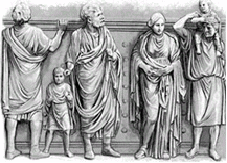 Part
6 The Love of kings
Part
6 The Love of kings Part
6 The Love of kings
Part
6 The Love of kings
Before every Roman election, “Family Values” was a chief topic of political rhetoric, along with the promise of welfare reform, cost-of-living increases for the pensioned and even suggestions of rewriting the Constitution. Judea loved and desired Roman protection, generosity, and social security; besides, they were good for business. There were rebels, as always. There was corruption, as always. The Caesars were the protector of their peace, the benefactor of their welfare, and the exercisers of their own brand of justice.
“The annual Temple-tribute was allowed to be transported to Jerusalem, and the alienation of these funds by the civil magistrates treated as sacrilege. As the Jews objected to bear arms, or march, on the Sabbath, they were freed from military service. On similar grounds, they were not obliged to appear in courts of law on their holy days. Augustus even ordered that, when the public distribution of corn [grain] or of money among the citizens fell on a Sabbath, the Jews were to receive their share on the following day… No wonder, that at the death of Caesar [g 44 BC] the Jews of Rome gathered for many nights, waking strange feelings of awe in the city, as they chanted in mournful melodies their Psalms around the pyre on which the body of their benefactor had been burnt, and raised their pathetic dirges.”1
Herod became ruler of Israel under the international protection of Rome. He had backed Pompey during Rome’s own rebellious incident, but had convinced the new Caesar of his loyalty. He consolidated his popularity with controlled benevolence and public works. His extensive building projects appeared at home as well as at Athens and Rhodes. He was ruthless, but Rome found this an admirable trait, as long as you were ruthless enough to stifle any rebellion without inciting more. Murder of opponents, including his own family, was a common practice. Anyone who was popular amongst the people could usually be converted with lucrative government contracts or bribery or they might just become the victim of scandalous reports or unsolved assassinations. This, of course, kept the price of bribery down.
Herod continued to defile the separation of the political power and the charitable ministry of the government. This was popular with the priesthood, which had become increasingly wealthy and, therefore, corrupt. Herod instituted new programs of social welfare to build a great society, a Kingdom of Heaven on earth. His programs mixed the power of government with the charity of the Levites’ public ministers. The voluntary contributions became an enforced political obligation. He was violating the Israelite constitution by returning the people to a system like that of Egypt.
Thou mayest not set a stranger over thee, which is not thy brother. … nor cause the people to return to Egypt. De. 17:14-20
But ignorance and pride made this easy. Greed and wantonness made it in inevitable. The Jews had developed a taste for the entitlements, leeks and onions of socialism, which God and Moses had forbid.
Herod was able to deceive the people because of their ignorance and the ignorance of their teachers, the Pharisees. Levites violated the rules of their ministry.
…Levi, shall have no part nor inheritance with Israel… De. 18:1-4.
It is clear that a violent coup had taken place, which caused the death of Zachariah, the father of John the Baptist.
From the blood of Abel unto the blood of Zacharias, which perished between the altar and the temple: verily I say unto you, It shall be required of this generation. Lu 11:51
All Hellenism had broken loose.2
Some believe the respectful Romans defiled the temple by entering it in order to remove the usurper, Aristobulus, but nothing would compare to the murder of the High Priest, Zachariah, who had been dispatched in a bloody assassination between the temple and the altar.
That upon you may come all the righteous blood shed upon the earth, from the blood of righteous Abel unto the blood of Zacharias son of Barachias, whom ye slew between the temple and the altar. Mt. 23:35
John was Jesus’ cousin, but was evidently raised away from Jerusalem, at least, in part, for his own protection. The annihilation of whole families was all too common in order to maintain power and wealth, a practice that has persisted throughout the ages.3
1Life and Times of Jesus the Messiah, Chapt. V
2“Hellenism is the antithesis of Judaism ....” The Secret of the Hanukkiyah.
3 In the Protevangelium Jacobi, ch. xxii, Elizabeth fled from Herod's assassins cried: "Mount of God, receive a mother with her child", and suddenly the mountain was divided and received her).